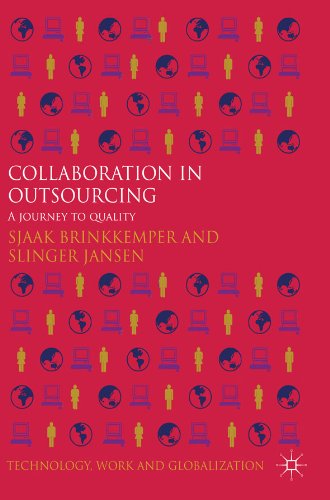This past week, Cospace had the distinct pleasure of hosting some crowded discussions during Austin’s Startup Week. One topic of particular interest to us, and clearly as well to the entrepreneurial community, was that of outsourcing. As our world continues to shrink, through technology that makes it possible to work with anyone wherever they might be, the idea of outsourcing is moving from its early roots in technology and engineering, to other professional skills such as design, writing, and marketing.
Collaboration in Outsourcing

 In February of this year, DR. Sjaak Brinkkemper, Professor of Organisation and Information at the Department of Information and Computing Sciences at Utrecht University, the Netherlands, and Slinger Jansen, Assistant Professor at the Department of Information and Computing Sciences at Utrecht University, published a book that explains in detail the outsourcing process for IT Professionals, from forging and sustaining solid relationships, to running successful IT projects using the latest innovations in outsourcing practice. That book, Collaboration in Outsourcing: A Journey to Quality (Technology, Work and Globalization), opens with a consideration paramount to any work you are considering outsourcing; outsourcing doesn’t mean someone else does it all for you.
In February of this year, DR. Sjaak Brinkkemper, Professor of Organisation and Information at the Department of Information and Computing Sciences at Utrecht University, the Netherlands, and Slinger Jansen, Assistant Professor at the Department of Information and Computing Sciences at Utrecht University, published a book that explains in detail the outsourcing process for IT Professionals, from forging and sustaining solid relationships, to running successful IT projects using the latest innovations in outsourcing practice. That book, Collaboration in Outsourcing: A Journey to Quality (Technology, Work and Globalization), opens with a consideration paramount to any work you are considering outsourcing; outsourcing doesn’t mean someone else does it all for you.
Effectively, outsourced projects are those in which collaboration with overseas organizations and resources results in those skilled profession working with you as part of the team.
Brinkkemper leads a group of about thirty researchers specializing in product software development and entrepreneurship. The main research themes of the group are methodology of product software development, implementation and adoption, and business-economic aspects of the product software industry. Jansen focuses on software product management and software ecosystems, with a strong entrepreneurial component. In collaborating with one another, they’ve explored the nuances of outsourcing and the efficiencies, benefits, and opportunities in collaborating through outsourced resources. The concept isn’t new though, in the 2009, a discussion on LinkedIn prompted a great perspective from Joe Vales, Senior Partner at Vales Consulting Group,
Collaborative outsourcing is the new “buzzword” of the outsourcing industry as service providers use the term to describe how they partner with clients and how they sit on the client’s side of the table to support their people oriented approach to serving clients…. But the best way of knowing whether you are experiencing a collaborative relationship is to look at your next meeting with your provider – do you see a conference room filled with your people and the outsourcers team… or do do you see ONE team looking to solve a problem?”
We can look back further though to 2007, Pat McCardle shared in Supply & Demand Chain Executive, “that PricewaterhouseCoopers’ (PwC) research strongly indicates that businesses today are actually asking a profoundly different but equally revealing question. That question is not whether many corporate functions should be outsourced, but how?” Companies that cite having incredible outsourcing arrangements were also those convinced that collaboration, rather than a conventional arms length customer/vendor agreement, is the key.
Of course, working with you as part of the team can be difficult, nearly impossible, when those individuals are on the other side of the world.
Four organizations that have cracked that nut
I’m going to start here in Austin with an Austin based firm developing some of the most incredible work in Ruby on Rails. Obviously then, not necessarily the “overseas” outsourcing as far as most are concerned; but certainly, an incredible business model none-the-less and one available to you wherever you might be. CabForward is the company that opened my eyes to the significance of leaving the expertise to the experts and collaborating through a process and project management that helps your organization scale technology effectively and efficiently. Cab works collaboratively with clients to ensure the efficiency and effectiveness of their Ruby on Rails and iOS developers with a focus on improving your business positioning on the web.
Bringing us overseas and open source is OSSCube who’s extensive team in India is second to none in open source software, working in PHP development for such notables as Avon and Intel. OSSCube establishes a collaborative team in various markets to ensure that you aren’t outsourcing but collaborating, more locally, with the team that manages your relationship with the developers in India.
Logan Gattis Designs takes the idea of collaboration even further, not outsourcing to any specific market to into many. Great design often demands in-country (in culture and in language) talent but finding someone in Chile to design your landing pages and print collateral can prove impossible. Working with a firm like Logan Gattis puts a designer on your team but leverages the expertise of talent in other markets to excel in delivering you what you need.
Cospace has had the distinct pleasure of getting to know MagRabbit recently and their recognition by the National Minority Supplier Development Council as Minority Business Enterprise of the year helps capstone the fact that collaborative outsourcing is both accessible and invaluable. Their work, with Dell, Adidas, Visa, Toyota, and more, in IT Solutions and Supply Chain Management helps companies throughout the world leverage the tremendous markets and talents in Asia.
Collaborating in Collaboration
What’s exciting about what I’ve been doing through the idea of Cospace is simply facilitating collaboration. W

